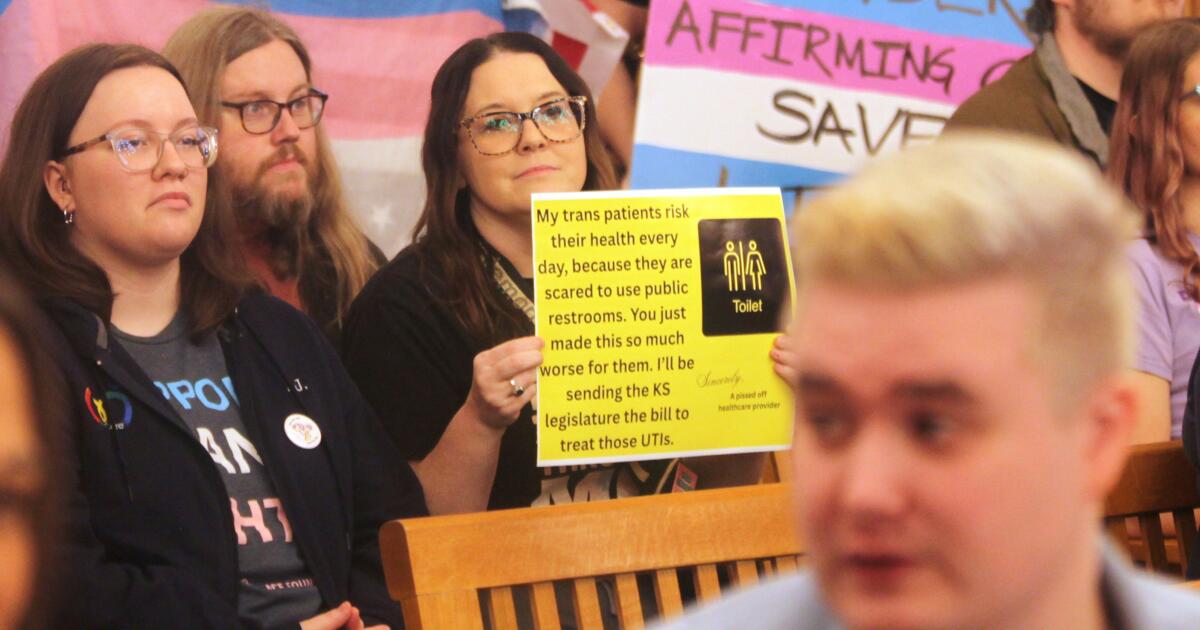New law puts Kansas at vanguard of denying trans identities on official documents
TOPEKA, Kan. — Kansas is set to invalidate about 1,700 driver’s licenses held by transgender residents and roughly as many birth certificates under a new law that goes beyond Republican-imposed restrictions in other states on listing gender identities in government documents.
The new law takes effect Thursday. Democratic Gov. Laura Kelly vetoed the measure, but the Legislature’s GOP supermajorities overrode it last week as Republican state lawmakers across the U.S. have pursued another round of measures to roll back transgender rights.
The bill prohibits documents from listing any sex other than the one assigned birth and invalidates any that reflect a conflicting gender identity. Florida, Tennessee and Texas also don’t allow driver’s licenses to reflect a trans person’s gender identity, and at least eight states besides Kansas have policies that bar trans residents from changing their birth certificates.
But only Kansas’ law requires reversing changes previously made for trans residents. Kansas officials expect to cancel about 1,700 driver’s licenses and issue new birth certificates for up to 1,800 people.
“It tells me that Kansas Republicans are interested in being on the vanguard of the culture war and in a race to the bottom,” said Democratic state Rep. Abi Boatman, a transgender Air Force veteran appointed in January to fill a vacant Wichita seat.
Kansas’ new law enjoyed nearly unanimous GOP support. It is the latest development in what has become an annual effort to further roll back transgender rights by Republicans in statehouses across the U.S., bolstered by policies and rhetoric from President Trump’s administration.
Trump and other Republicans attack research-backed conclusions that gender can change or be fluid, which they frame as radical “gender ideology.” GOP lawmakers in Kansas regularly describe transgender girls and women as male, and say that in doing so they are protecting women.
Like other Republicans, Kansas Senate Majority Leader Chase Blasi said Trump’s reelection and other GOP victories in 2024 show that voters want “to return to common sense” on gender.
“When I go home, people believe there are just two sexes, male and female,” Blasi said. “It’s basic biology I learned in high school.”
Kelly supports transgender rights, but GOP lawmakers have overridden her vetoes three of the last four years. Kansas bans gender-affirming care for minors and bars transgender women and girls from female sports teams, kindergarten through college.
Transgender people can’t use public restrooms, locker rooms or other single-sex facilities associated with their gender identities, though there was no enforcement mechanism until this year’s law added tough new provisions.
Transgender people have said carrying IDs that misgender them opens them to intrusive questions, harassment and even violence when they show it to police, merchants and others.
In 2023, Republicans halted changes in Kansas birth certificates and driver’s licenses by enacting a measure ending the state’s legal recognition of trans residents’ gender identities. Though the law didn’t mention either document, it legally defined male and female by a person’s “biological reproductive system” at birth.
However, a lawsuit led to state court decisions that permitted driver’s license changes to resume last year.
Legislators in at least seven other states are considering bills to prevent transgender people from changing one or both documents, according to a search using the bill-tracking software Plural.
But none would reverse past changes.
The extra step by Kansas legislators reinforces a message “that trans people aren’t welcome,” said Anthony Alvarez, a transgender University of Kansas student who works for an LGBTQ+ rights group.
Kansas is likely to notify transgender residents by mail that their driver’s licenses are no longer valid and they need to go to a local licensing office to get a new one, said Zachary Denney, spokesperson for the agency that issues them.
The Legislature hasn’t earmarked funds to cover the cost, so each person will be charged for it — $26 for a standard license.
Alvarez already has had four IDs in four years as he’s changed his name, changed his gender marker and turned 21.
He’s always planned to stay in his native Kansas after receiving his history degree this spring.
But, he said, “they’re just making it harder and harder for me to live in the state that I love.”
Hanna writes for the Associated Press.
